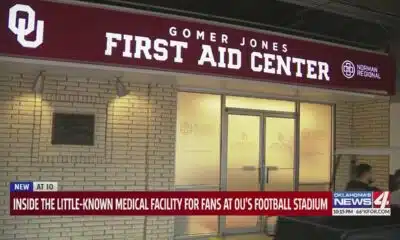News from the South - Missouri News Feed
Missouri senators seek to bar kids from accessing pornographic materials from libraries
Missouri senators seek to bar kids from accessing pornographic materials from libraries
by Annelise Hanshaw, Missouri Independent
March 4, 2025
The Missouri Senate Education Committee discussed legislation Tuesday seeking to ban materials deemed explicit from digital libraries and hold library boards responsible for the content made available to minors.
State Sen. Mary Elizabeth Coleman, an Arnold Republican, filed legislation applying safety measures to “digital library catalogs” after hearing about explicit material available on a state-subsidized application used by public schools.
Her bill adopts the state’s current definition of “pornographic for minors,” which includes “has a tendency to cater or appeal to a prurient interest of minors.”
Sora, an app school districts provide to students through a program run by the Missouri Secretary of State, allows students to check out books digitally. But Coleman said some resources have inappropriate content and link out to explicit material.
“It provides access to a really broad variety of titles, many of which are fantastic, and allows educators to provide books they otherwise couldn’t afford,” Coleman said. “Unfortunately, there are a lot of other materials that are available, including sexually explicit material.”
She contacted both the Secretary of State’s office and the Department of Elementary and Secondary Education last year. Both told her it was a problem for school boards to handle.
Since 2003, libraries have been responsible for blocking access to pornographic content on their computers and internet terminals. Coleman’s bill would add digital resources, which can be accessed from home, to the existing statute and create accountability measures.
Schools would have to publish a list of required reading materials on their websites and allow parents access to digital library resources.
Parents would be able to challenge resources as inappropriate, with results of such claims available online. They could sue school personnel, including librarians, for not following the law as a result of “gross negligence” or intentional conduct.
Coleman said school districts should stop using Sora if they cannot thoroughly monitor its catalog.
Mary Catherine Martin, an attorney with conservative law firm Thomas More Society, said she helped draft the legislation to put the onus on schools.
“What we need is an enforcement mechanism that requires school districts to get ahead (of the content) and gives them the obligation of screening things before they hand them to the children,” she said.
State Sen. Rick Brattin, a Harrisonville Republican and chair of the education committee, said some content is “definitely not G-rated.”
“To me this is no different than if a school district just left a gun laying somewhere and then wants to act dumb,” he said.
The committee also heard a bill sponsored by state Sen. Nick Schroer, a Republican from Defiance, that would hold library board members accountable for material accessible to children. The bill would add board members to a 2022 law that makes providing explicit sexual material to a minor a class A misdemeanor.
When the law was passed in 2022, some expressed concerns that it would lead to “book banning” and suppression of LGBTQ+ literature.
Schroer said his bill would “protect the innocence and integrity of children’s learning environment.”
The legislation would keep the existing definition of explicit sexual material, which only applies to visual material.
Brattin, who helped draft the bill, said it didn’t include literature because of opposition.
“I think this is just a common sense approach to things,” he said.
The American Library Association included Schroer’s legislation in a list of 98 “adverse” bills. The organization noted a legislative push in recent years to “impair” librarians from providing diverse materials.
These bills come less than two years after a rule by former Missouri Secretary of State Jay Ashcroft that requires libraries to create policies preventing minors from accessing obscene materials. Thousands of public comments opposed the rule, calling it censorship.
GET THE MORNING HEADLINES.
Missouri Independent is part of States Newsroom, a nonprofit news network supported by grants and a coalition of donors as a 501c(3) public charity. Missouri Independent maintains editorial independence. Contact Editor Jason Hancock for questions: info@missouriindependent.com.
The post Missouri senators seek to bar kids from accessing pornographic materials from libraries appeared first on missouriindependent.com
News from the South - Missouri News Feed
Five new Missouri laws to know that become official Thursday
SUMMARY: Starting August 28, 2025, several Missouri laws will take effect, impacting economy, safety, and more. HB 567 ends mandated paid sick leave and halts minimum wage cost-of-living increases. SB 28 eliminates temporary vehicle tags, requiring sales tax payment and issuance of printed plates at purchase. SB 43 criminalizes hazing in universities, limits childhood marriage licenses, and encourages reporting hazing incidents with immunity. SB 82 restricts water exports outside Missouri, requiring permits and oversight to protect resources. SB 133 mandates contacting Missouri 811 before any digging to prevent utility damage. Additional laws address newborn safety, hearing aids, substitute teaching, school participation, cell phone policies, invasive plants, and court interpreters.
The post Five new Missouri laws to know that become official Thursday appeared first on fox2now.com
News from the South - Missouri News Feed
Teen survives explosion, family speaks out
SUMMARY: Eighteen-year-old Dante Anthony survived a devastating house explosion in North St. Louis County on August 25th, which left him with second- and third-degree burns covering 85% of his body. Trapped by collapsed debris and flames, Dante escaped through the fire but remains hospitalized in critical condition, sedated and enduring intense pain. His family lost their home and belongings, including keepsakes. In response, his uncle Terence has organized a GoFundMe and a benefit concert at Granville Theater on August 31st to support Dante’s recovery. Despite the trauma, Dante’s athletic spirit and community support are helping his long road to healing and future plans in sales.
Eighteen-year-old Dontea Hardy’s life was changed in a matter of seconds when an explosion ripped through his family’s home on Aug. 25.
St. Louis News: FOX 2 covers news, weather, and sports in Missouri and Illinois. Read more about this story or see the latest updates on our website https://FOX2Now.com
Follow FOX 2 on social media:
YouTube: https://www.youtube.com/FOX2Now
Facebook: https://www.facebook.com/FOX2Now/
Twitter: https://twitter.com/FOX2Now/
Instagram: https://www.instagram.com/fox2now/
TikTok: https://tiktok.com/@fox2now
SnapChat: https://www.snapchat.com/add/fox2now
News from the South - Missouri News Feed
Who was Hunter Simoncic? KCK officer killed by driver in overnight police chase
SUMMARY: Kansas City, Kansas Police Officer Hunter Simoncic, 26, was tragically killed early Tuesday when struck by a driver during a police chase. A Galesburg native, he graduated from the police academy in November 2023 and held degrees in sociology and forensic science. Known for his dedication to youth, Simoncic volunteered reading to students and worked as a juvenile detention shift supervisor. Kansas City officials honored his sacrifice, emphasizing his community impact. Dennis Edward Mitchell III has been arrested and faces multiple charges related to Simoncic’s death. Donations to support Simoncic’s family can be made through the KCK Fraternal Order of Police Memorial Fund.
The post Who was Hunter Simoncic? KCK officer killed by driver in overnight police chase appeared first on fox4kc.com
-
News from the South - Arkansas News Feed6 days ago
New I-55 bridge between Arkansas, Tennessee named after region’s three ‘Kings’
-
News from the South - Texas News Feed4 days ago
DEA agents uncover 'torture chamber,' buried drugs and bones at Kentucky home
-
Local News7 days ago
Picayune Police Department increases effectiveness of drug busts, leading to decrease in offenses
-
News from the South - Louisiana News Feed7 days ago
Families with citizen children deported by ICE sue Trump administration
-
News from the South - Georgia News Feed7 days ago
Bookman: Here’s how Georgia’s 2020 election crisis will factor into 2026 GOP campaigns for governor
-
News from the South - Missouri News Feed6 days ago
Missouri settles lawsuit over prison isolation policies for people with HIV
-
News from the South - Virginia News Feed6 days ago
Erin: Tropical storm force winds 600 miles wide eases into Atlantic | North Carolina
-
Our Mississippi Home6 days ago
Vardaman: The Sweet Potato Capital Serving Up Love, Tradition, and Flavor at Sweet Potato Sweets













































